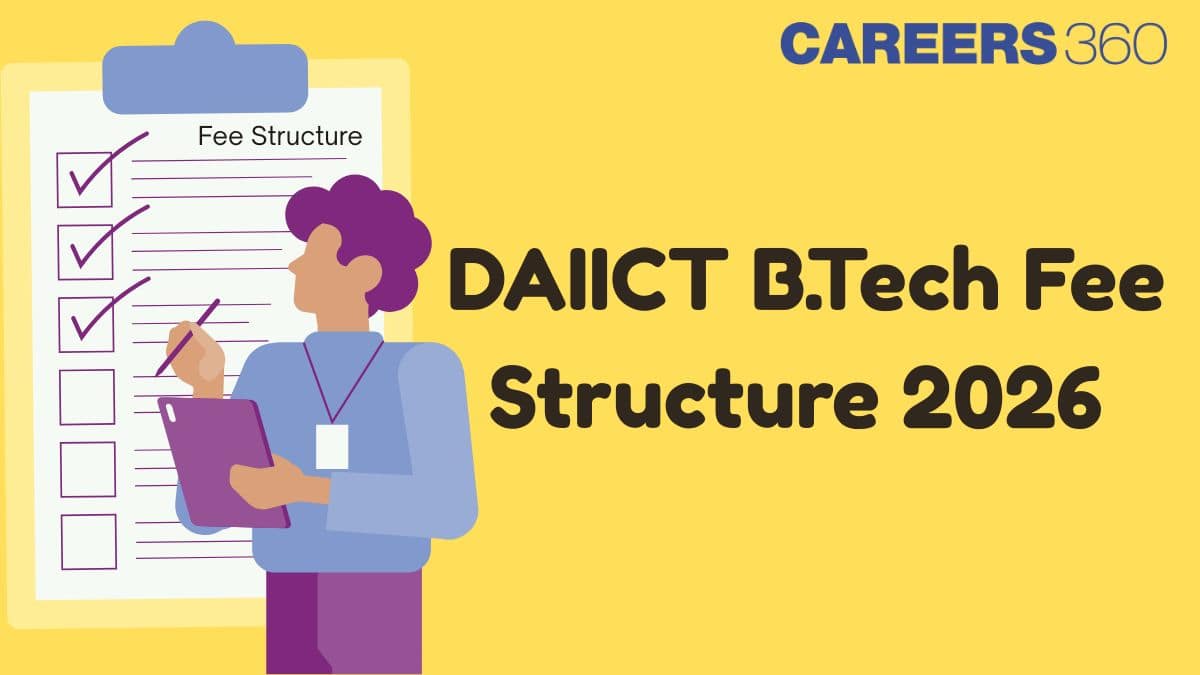DAIICT B.Tech Fee Structure 2026 - All India, Gujarat and NRI Category
DAIICT B.Tech Fee Structure 2026 - Dhirubhai Ambani Institute of Information and Communication Technology will release the DAIICT 2026 BTech fee structure on the official website, daiict.ac.in. The same will be updated here when released. As per the previous year's fee structure, the DAIICET BTech 2026 tuition fee was Rs. 1,78,500 per semester. The BTech fees also include multiple fee components such as tuition fees, admission fees, and other applicable charges. These fees can be paid as one-time payments or semester-wise to finalise the DAIICT B.Tech admission 2026. Shortlisted candidates will be required to pay the DAIICT 2026 B.Tech fees, including tuition fees for the first semester and a caution deposit, after the DAIICT 2026 counselling. Refer to the article below for the complete DAIICT B.Tech fee structure 2026.

DAIICT B.Tech 2026 Fee Structure
To finalise the admission process of the institute and pursue the engineering programme will have to pay a certain amount of fee. Candidates have to pay the DAIICT 2026 B.Tech fee for the first time after counselling to affirm their seat for admission. As B.Tech admissions are offered for three categories of candidates, the amount payable by Indian and foreign candidates is different. Candidates may find the B.Tech 2026 fee structure for DAIICT below for better understanding. The fee structure specified below is as per the previous year’s DAIICT 2026 fee notification.
DAIICT 2026 B.Tech Fee Structure for Indian Students
BE/BTech Fee Components | Amount |
Tuition Fee | Rs. 1,78,500 per semester |
Registration Fee | Rs.2,500 per semester |
Caution Deposit | Rs. 25,000/- (Refundable at the end of the programme) |
Hostel Rent | Rs. 35,000 per semester |
Food | On actuals. There are multiple food options available on campus (The expense will be approximately Rs. 5,500 per month) |
Hostel Facility
The engineering programmes offered at DAIICT are all residential, i.e candidates will be required to stay on campus for the duration of their course.. Thus, candidates interested in pursuing B.Tech at Dhirubhai Ambani Institute of Information and Communication Technology will be required to pay the hostel fees without fail. There will be no option to apply for hostel fee deduction for DAIICT 2026.
Scholarship for DAIICT B.Tech Candidates
DA-IICT offers Merit-cum-Means Scholarships for economically backward students. The institute also provides merit-based scholarships to eligible candidates. Some of them are: The Satnaam Wahe Guruji Scholarships for B.Tech., Jai Jhulelal Scholarships for B.Tech. Students and UG/PG Cybage Khushboo Scholarships etc. The basic eligibility criteria for DAIICT B.Tech programme is a minimum 60% aggregate percentage in Class X and Class XII Board Examinations. Candidates should check the complete guidelines to determine if they are eligible for the scholarships.
Frequently Asked Questions (FAQs)
The DAIICT 2026 fee structure includes the various categories for which candidates will have to pay fees for during the course duration.
The tuition fee for DAIICT is Rs. 1,78,500 per semester (as per previous year).
List of Related colleges
Questions related to DAIICT Gandhinagar
On Question asked by student community
DA-IICT does not officially release a specific MSC IT cutoff score. Instead, they release a merit list based on the performance of candidates in the entrance test. To be considered for the DAIICT merit list, candidates must meet the following academic requirements:
-
Graduation: Minimum of 60% aggregate marks (or equivalent
With JEE Main rank 101,571, getting ECE in DAIICT is very hard because their cutoff is much lower, around 12,000. Even with reservations, your rank is higher than their usual cutoff.
You can try other private colleges or state counseling where cutoff ranks are higher. Also, some colleges have management
With a 92.7%ile in JEE main 2025 and belonging to a general category from Rajasthan , your prospects of securing admissions in top tier NITs are limited . However , you may have opportunities in newer or less competitive NITs
Potential NITs based on your percentile :
NIT Mizoram
NIT
Hello aspirant!
DAIICT Gandhinagar uses JEE Main ranks for admission. In 2024, the closing ranks for All India general category were as follows:
-
Mathematics & Computing was highly competitive, closing around rank 80.
-
The core ICT stream closed near rank 139.
-
Electronics & VLSI was a bit less competitive, closing
While admission to BTech programs is mostly determined by your JEE Main rank, your 12th grade science grades are taken into account for eligibility at DAIICT. You must have earned a 12th grade diploma in mathematics, physics, and one of the following subjects: biology, computer science, chemistry, or biotechnology. For
Applications for Admissions are open.
Among top 100 Universities Globally in the Times Higher Education (THE) Interdisciplinary Science Rankings 2026
Amrita University B.Tech 2026
ApplyRecognized as Institute of Eminence by Govt. of India | NAAC ‘A++’ Grade | Upto 75% Scholarships | Application Deadline: 15th Jan
Amity University-Noida M.Tech Admissions 2026
ApplyAmong top 100 Universities Globally in the Times Higher Education (THE) Interdisciplinary Science Rankings 2026
Parul University B-TECH Admissions 2026
ApplyIndia's youngest NAAC A++ accredited University | NIRF rank band 151-200 | 2200 Recruiters | 45.98 Lakhs Highest Package
UPES B.Tech Admissions 2026
ApplyLast Date to Apply: 25th Feb | Ranked #43 among Engineering colleges in India by NIRF | Highest Package 1.3 CR , 100% Placements
Chandigarh University Admissions 2026
ApplyNAAC A+ Accredited | Among top 2% Universities Globally (QS World University Rankings 2026)
